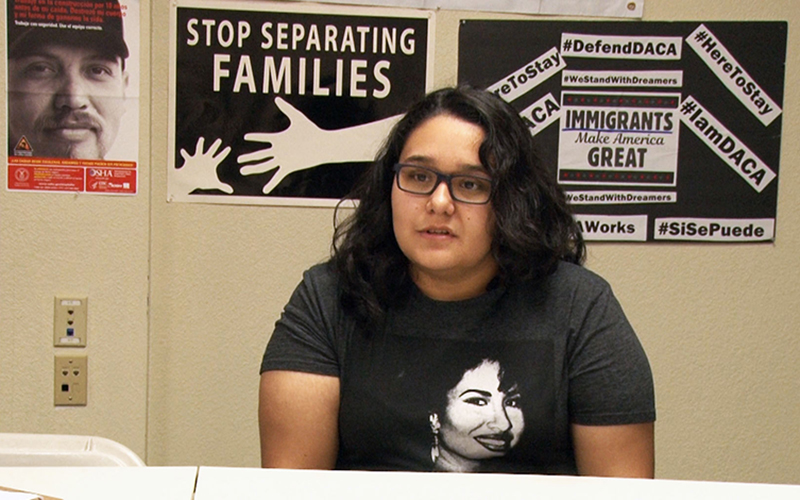
Jazmin Nuñez, a volunteer at LUCHA. She isn’t a DACA recipient, but her sister is. (Photo by Fortesa Latifi/Cronkite News)
PHOENIX – Jazmin Nuñez spends her days at Living United for Change In Arizona (LUCHA) helping DACA recipients navigate the murky waters of their future.
When U.S. Attorney General Jeff Sessions announced President Donald Trump’s plan to end DACA, the Department of Homeland Security instituted a deadline. DACA recipients whose protections would expire between Sept. 5 and March 5, 2018 are eligible to apply for renewal before Oct. 5. If their application is accepted, their DACA protections will continue for two more years.
But what happens to those DACA recipients who didn’t fall within that renewal window? People flocked to LUCHA’s Phoenix offices looking for help with the application process. Sometimes, the staff at LUCHA was able to help.
Sometimes, they had to deliver the bad news.
“I think I even cried at one point,” Nuñez said. “It was even worse for me because I had to tell one of my cousins personally that she couldn’t renew anymore and we were just about to send in her paperwork.”
Nuñez was born in the United States and is a United States citizen, as are her two younger brothers. Her older sister, Aracely, is not.
Aracely Nuñez is a 22-year-old DACA recipient. She was born in Mexico and brought to the U.S. when she was 2 years old. She hasn’t been back to Mexico since. Her DACA protections expire after March 5, 2018, meaning she isn’t eligible to renew.
“Now she’s been talking about maybe going back to Mexico,” Nunez said. “But I don’t think it’s the best choice for her because she’s been here her whole life. She doesn’t know anything over there.”
See related stories:
Nunez said her sister’s situation is the motivation for her work at LUCHA.
“Everything that I’ve been doing is to show her that she’s not alone in this,” she said.
Jose Patino is in the same predicament as Aracely Nuñez. Patino is the Director of Campaigns at Aliento, a youth-led organization which specializes on activism for undocumented people.
Patino is 28 years old. He was brought to the United States when he was 6. As he worked to help other DACA recipients with the renewal process through Aliento, he realized he wouldn’t be eligible to renew his own protections. His DACA expires on Feb. 25, 2019.
He knows the date by heart.
He said he was happy that other recipients would be eligible for renewal, but “upset and still saddened” that he and others like him wouldn’t be able to.
“I think about the effect that’s going to have on us,” Patino said. “One is losing our jobs. One is not having a driver’s license.”
When Patino was a child, he broke his left arm. His parents were undocumented, so they didn’t have driver’s licenses. The family waited three hours for a documented neighbor to return home to drive him to the hospital.
When he thought about his DACA protections expiring, Patino said he worried about moments like that happening to other families across the country.
Patino has three siblings. They are all DACA recipients. None of them are eligible to renew.
Joshua De La Ossa, an immigration lawyer in Phoenix, said he has had “many painful conversations” with clients who were ineligible for renewal. His advice was the same for each of them: “Stay out of trouble,” De La Ossa said. “Do not come into contact with any state, local, or municipal law enforcement.”
De La Ossa has attended several DACA renewal events across the Valley and advised the community to “reach out to an immigration attorney to assess their particular situation.” He said many people are eligible for other protections they might not be aware of.
It isn’t clear what will happen to DACA recipients once their protections expire. Trump has given conflicting statements on the issue, including a tweet last month which told DACA recipients “…you have nothing to worry about.”
But Nuñez is worried about her sister’s DACA protection expiring. She’s worried if her sister goes back to Mexico, she may not be able to come back to the United States in the future.
“The countdown of her DACA expiring is coming to an end,” Nuñez said.
Nuñez’s parents have given their eldest daughter clear instructions.
“They tell her, ‘You’re not leaving until they kick you out,'” Nuñez said. “That’s kind of the mentality that we have.”
Patino isn’t planning on giving up either. He’s in Washington D.C. with other Aliento members lobbying Arizona senators and representatives in support of the DREAM Act.
“We want to make sure we’re having dialogue and moving forward,” Patino said. “It’s a human issue.”